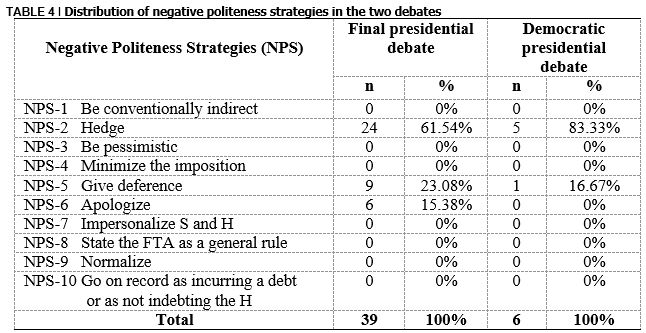Shaping political image through politeness strategies in the presidential debates
DOI:
https://doi.org/10.21070/jees.v7i1.1660Keywords:
positive politeness, negative politeness, presidential debates, face threatening actAbstract
Politeness involves evaluations and attitudes which are closely connected to the assessment of actions. Politeness investigations in presidential debates enables voters to assess the candidates’ behavior to make well-informed decision during the election. The present study investigated politeness strategies in two different presidential debates within the United States electoral context: the Democratic party and the final presidential debates. Data were analyzed by adopting the coding scheme in Brown and Levinson’s frameworks. The overall result indicated that both the presidential debates used more positive politeness strategies than the negative politeness. PPS-10 (offer and promise), PPS-12 (include speaker and hearer in the activity) and NPS-2 (hedge) were more frequently used in both types of debates. PPS-3 (intensify interest to hearer) was frequent in the democratic debate alone. Meanwhile, PPS-15 (give gits to hearer) was frequent in the final presidential debate alone. The findings imply that the use of the politeness strategies can shape the candidates’ positive political images in the presidential debates.
HIGHLIGHTS:
- Findings show that the selected politeness strategies are to shape candidates’ positive political images in the presidential debates.
- Having positive images such as not harsh, having good behavior are considered to be critical importance in determining the winning of the election.
- Negative politeness is less preferably used and has been less taken into account as proper rhetorical skills in the debates.
Downloads
References
Ardila, J. A. G. (2019). Impoliteness as a rhetorical strategy in Spain’s politics. Journal of Pragmatics, 140, 160–170. https://doi.org/10.1016/j.pragma.2018.11.017
Benoit, W. L., Hansen, G. J., & Verser, R. M. (2003). A Meta-analysis of the Effects of Viewing U.S. Presidential Debates. Communication Monographs, 70(4), 335–350.
https://doi.org/10.1080/0363775032000179133
Brown, P., & Levinson, S. (1987). Politeness: Some Universals in Language Use. Cambridge University Press.
Brummet, B. S. (2018). Rhetoric in Popular Culture (5th ed.). SAGE.
Dailey, W. O., Hinck, E. A., & Hinck, S. S. (2005). Audience Perceptions of Politeness and Advocacy Skills in the 2000 and 2004 Presidential Debates. Argumentation and Advocacy, 41(4), 196–210. https://doi.org/10.1080/00028533.2005.11821630
Fracchiolla, B. (2011). Politeness as a strategy of attack in a gendered political debate-The Royal-Sarkozy debate. Journal of Pragmatics, 43(10), 2480–2488. https://doi.org/10.1016/j.pragma.2011.02.006
García, F. F. (2014). Impoliteness, pseudo-politeness, strategic politeness? On the nature of communicative behaviour in electoral debates. Círculo de Lingüística Aplicada a la Comunicación, 58, 60–89. http://www.ucm.es/info/circulo/no58/fernandez.pdf
Goffman, E. (1967). Interaction Ritual, Essays on Face-to-Face Behavior. Doubleday.
Hinck, Edward A & Hinck, S. S. (2002). Politeness Strategies in the 1992 Vice Presidential and Presidential Debates. Argumentation and Advocacy, 38, 234-250. https://doi.org/https://doi.org/10.1080/00028533.2002.11821570
Jamieson, K. H. (1987). Television, presidential campaigns, and debates. In J. L. Swerdlow (Ed.), Presidential debates 1988 and beyond (hal. 27–33). Congressional Quarterly Inc.
Pakzadian, M. (2012). Politeness principle in 2008 presidential debates between Mc Cain and Obama. Mediterranean Journal of Social Sciences, 3(3), 351–357. https://doi.org/10.5901/mjss.2012.v3n3p351
Ryabova, M. (2015). Politeness Strategy in Everyday Communication. Procedia - Social and Behavioral Sciences, 206(November), 90–95. https://doi.org/10.1016/j.sbspro.2015.10.033
Shigemitsu, Y. (2003). Politeness Strategies in the Context of Argument In Japanese Debate Shows. ACADEMIC REPORTS, 26(2), 26–35.
Siepmann, C. (1962). Were they great? In S.Kraus (Ed.), The great debates: Background, perspective, effects (hal. 132–141). Indiana University Press.
Steinberg, A. J. F. & D. L. (2005). Argumentation and Debate: Critical Thinking for Reasoned Decision Making. Wadsworth.
Wilamova, S. (2005). On the Function of Hedging Devices in Negatively Polite Discourse. BRNO Studies in English, 31(1996), 85–93.
Yasmeen, R., Jabeen, M., & Akram, A. (2014). Politeness and the Language of Pakistani Politicians. Academic Research International, 5(3), 245–253.

Published
How to Cite
Issue
Section
License
Copyright (c) 2022 Ahmad Amin Dalimunte, Fengwei Wen

This work is licensed under a Creative Commons Attribution 4.0 International License.







